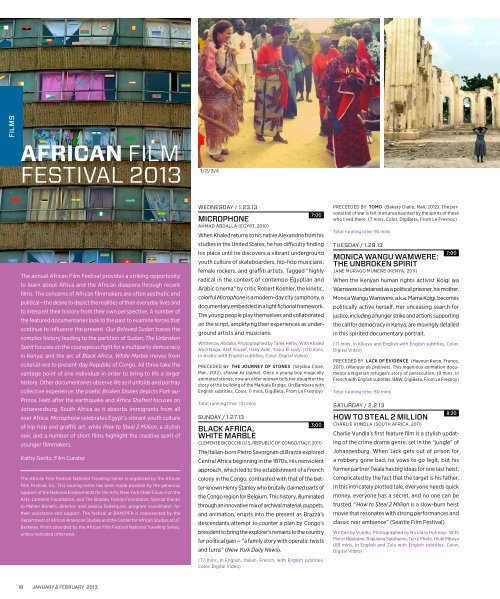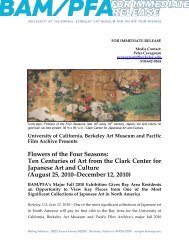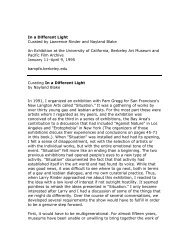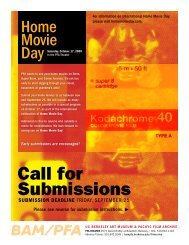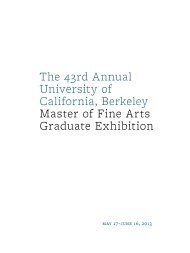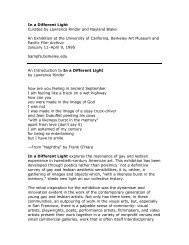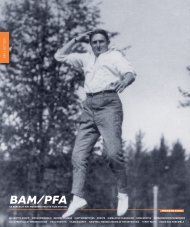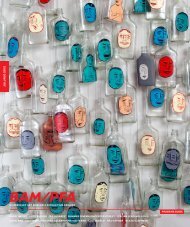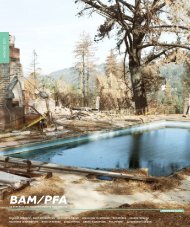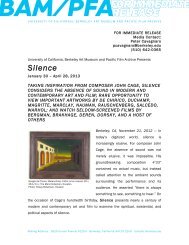January & February 2013 - Berkeley Art Museum and Pacific Film ...
January & February 2013 - Berkeley Art Museum and Pacific Film ...
January & February 2013 - Berkeley Art Museum and Pacific Film ...
- No tags were found...
You also want an ePaper? Increase the reach of your titles
YUMPU automatically turns print PDFs into web optimized ePapers that Google loves.
FILMSAfrican <strong>Film</strong>Festival <strong>2013</strong>1/2/3/4The annual African <strong>Film</strong> Festival provides a striking opportunityto learn about Africa <strong>and</strong> the African diaspora through recentfilms. The concerns of African filmmakers are often aesthetic <strong>and</strong>political—the desire to depict the realities of their everyday lives <strong>and</strong>to interpret their history from their own perspective. A number ofthe featured documentaries look to the past to examine forces thatcontinue to influence the present. Our Beloved Sudan traces thecomplex history leading to the partition of Sudan; The UnbrokenSpirit focuses on the courageous fight for a multiparty democracyin Kenya; <strong>and</strong> the arc of Black Africa, White Marble moves fromcolonial-era to present-day Republic of Congo. All three take thevantage point of one individual in order to bring to life a largerhistory. Other documentaries observe life as it unfolds <strong>and</strong> portraycollective experience: the poetic Broken Stones depicts Port-au-Prince, Haiti after the earthquake <strong>and</strong> Africa Shafted focuses onJohannesburg, South Africa as it absorbs immigrants from allover Africa. Microphone celebrates Egypt’s vibrant youth cultureof hip-hop <strong>and</strong> graffiti art, while How to Steal 2 Million, a stylishnoir, <strong>and</strong> a number of short films highlight the creative spirit ofyounger filmmakers.Kathy Geritz, <strong>Film</strong> CuratorThe African <strong>Film</strong> Festival National Traveling Series is organized by the African<strong>Film</strong> Festival, Inc. This touring series has been made possible by the generoussupport of the National Endowments for the <strong>Art</strong>s, New York State Council on the<strong>Art</strong>s, Lambent Foundation, <strong>and</strong> The Bradley Family Foundation. Special thanksto Mahen Bonetti, director, <strong>and</strong> Jessica Sederquist, program coordinator, fortheir assistance <strong>and</strong> support. The festival at BAM/PFA is copresented by theDepartment of African American Studies <strong>and</strong> the Center for African Studies at UC<strong>Berkeley</strong>. Prints provided by the African <strong>Film</strong> Festival National Traveling Series,unless indicated otherwise.Wednesday / 1.23.137:00MicrophoneAhmad Abdalla (Egypt, 2010)When Khaled returns to his native Alex<strong>and</strong>ria from hisstudies in the United States, he has difficulty findinghis place until he discovers a vibrant undergroundyouth culture of skateboarders, hip-hop musicians,female rockers, <strong>and</strong> graffiti artists. Tagged “highlyradical in the context of contempo Egyptian <strong>and</strong>Arabic cinema” by critic Robert Koehler, the kinetic,colorful Microphone is a modern-day city symphony, adocumentary embedded in a light fictional framework.The young people play themselves <strong>and</strong> collaboratedon the script, amplifying their experiences as undergroundartists <strong>and</strong> musicians.Written by Abdalla. Photographed by Tarek Hefny. With KhaledAbol Naga, Atef Yousef, Hany Adel, Yosra El Lozy. (120 mins,In Arabic with English subtitles, Color, Digital Video)Preceded by The Journey of Stones (Seydou Cissé,Mali, 2012). (Faraw ka taama). Once a young boy magicallyanimated stones; now an older woman tells her daughter thestory of the building of the Markala Bridge. (In Bambara withEnglish subtitles, Color, 11 mins, DigiBeta, From Le Fresnoy)Total running time: 131 minsSunday / 1.27.133:00Black Africa,White MarbleClemente Bicocchi (U.S./Republic of Congo/Italy, 2011)The Italian-born Pietro Savorgnan di Brazzà exploredCentral Africa beginning in the 1870s. His nonviolentapproach, which led to the establishment of a Frenchcolony in the Congo, contrasted with that of the better-knownHenry Stanley who brutally claimed parts ofthe Congo region for Belgium. This history, illuminatedthrough an innovative mix of archival material, puppets,<strong>and</strong> animation, erupts into the present as Brazzà’sdescendants attempt to counter a plan by Congo’spresident to bring the explorer’s remains to the countryfor political gain— “a family story with operatic twists<strong>and</strong> turns” (New York Daily News).(77 mins, In English, Italian, French, with English subtitles,Color, Digital Video)Preceeded by Tomo (Bakary Diallo, Mali, 2012). The personaltoll of war is felt in an area haunted by the spirits of thosewho lived there. (7 mins, Color, DigiBeta, From Le Fresnoy)Total running time: 93 minsTuesday / 1.29.13Monica Wangu Wamwere:The Unbroken SpiritJane Murago Munene (Kenya, 2011)7:00When the Kenyan human rights activist Koigi waWamwere is detained as a political prisoner, his mother,Monica Wangu Wamwere, a.k.a. Mama Koigi, becomespolitically active herself. Her unceasing search forjustice, including a hunger strike <strong>and</strong> actions supportingthe call for democracy in Kenya, are movingly detailedin this spirited documentary portrait.(71 mins, In Kikuyu <strong>and</strong> English with English subtitles, Color,Digital Video)Preceded by Lack of Evidence (Hayoun Kwon, France,2011). (Manque de preuves). This ingenious animation documentsa Nigerian refugee’s story of persecution. (9 mins, InFrench with English subtitles, B&W, DigiBeta, From Le Fresnoy)Total running time: 80 minsSaturday / 2.2.13How to Steal 2 MillionCharlie Vundla (South Africa, 2011)8:20Charlie Vundla’s first feature film is a stylish updatingof the crime drama genre, set in the “jungle” ofJohannesburg. When Jack gets out of prison fora robbery gone bad, he vows to go legit, but hisformer partner Twala has big ideas for one last heist,complicated by the fact that the target is his father.In this intricately plotted tale, everyone needs quickmoney, everyone has a secret, <strong>and</strong> no one can betrusted. “How to Steal 2 Million is a slow-burn heistmovie that resonates with strong performances <strong>and</strong>classic noir ambience” (Seattle <strong>Film</strong> Festival).Written by Vundla. Photographed by Nicolaas Hofmeyr. WithMenzi Ngubane, Rapulana Seiphemo, Terry Pheto, Hlubi Mboya(89 mins, In English <strong>and</strong> Zulu with English subtitles, Color,Digital Video)18 january & FEBRuary <strong>2013</strong>


